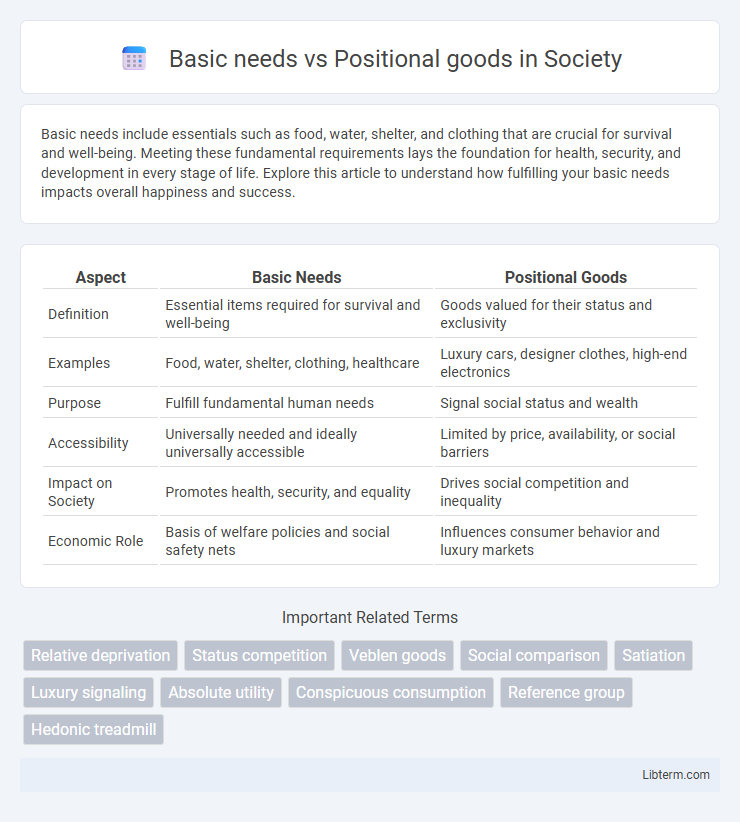Basic needs include essentials such as food, water, shelter, and clothing that are crucial for survival and well-being. Meeting these fundamental requirements lays the foundation for health, security, and development in every stage of life. Explore this article to understand how fulfilling your basic needs impacts overall happiness and success.
Table of Comparison
| Aspect | Basic Needs | Positional Goods |
|---|---|---|
| Definition | Essential items required for survival and well-being | Goods valued for their status and exclusivity |
| Examples | Food, water, shelter, clothing, healthcare | Luxury cars, designer clothes, high-end electronics |
| Purpose | Fulfill fundamental human needs | Signal social status and wealth |
| Accessibility | Universally needed and ideally universally accessible | Limited by price, availability, or social barriers |
| Impact on Society | Promotes health, security, and equality | Drives social competition and inequality |
| Economic Role | Basis of welfare policies and social safety nets | Influences consumer behavior and luxury markets |
Understanding Basic Needs: Definition and Examples
Basic needs refer to essential requirements for human survival and well-being, including food, water, shelter, clothing, and healthcare. These needs are universal and must be met to maintain a minimum standard of living and physical health. Examples of positional goods, by contrast, are luxury items or status symbols such as designer clothing, expensive cars, or upscale real estate, which derive value primarily from social comparison rather than intrinsic necessity.
What Are Positional Goods?
Positional goods are items whose value is derived primarily from their exclusivity and status-signaling potential rather than their intrinsic utility, distinguishing them from basic needs such as food, shelter, and clothing. Examples of positional goods include luxury watches, designer clothing, and high-end cars, which confer social prestige and competitive advantage in societal ranking. The consumption of positional goods often drives conspicuous behavior aimed at demonstrating wealth and social distinction, influencing economic and social dynamics beyond fulfilling fundamental needs.
Key Differences Between Basic Needs and Positional Goods
Basic needs refer to essential items required for survival and well-being, such as food, water, shelter, and healthcare, which fulfill fundamental physiological and safety requirements. Positional goods, on the other hand, are items whose value is derived largely from their exclusivity and status signaling, including luxury cars, designer clothing, and high-end electronics. The key differences lie in their purpose: basic needs satisfy universal and non-negotiable requirements, while positional goods serve social comparison and status differentiation within a society.
The Role of Basic Needs in Human Well-being
Basic needs, including food, shelter, and healthcare, form the foundation of human well-being by ensuring physical survival and psychological stability. Meeting these essentials supports cognitive development, emotional resilience, and social participation, which are critical for overall life satisfaction. In contrast, positional goods, which confer status and social comparison advantages, have a less direct impact on fundamental well-being and often lead to diminishing returns in happiness.
Social Status and the Value of Positional Goods
Social status significantly influences the perceived value of positional goods, which are sought after not for their intrinsic utility but for the prestige and social distinction they confer. Unlike basic needs such as food and shelter that fulfill fundamental survival requirements, positional goods create competitive consumption patterns where individuals prioritize acquiring items that elevate their social ranking. This dynamic drives demand for luxury brands, exclusive experiences, and status symbols, reinforcing social hierarchies and shaping consumer behavior.
Economic Implications of Basic Needs Fulfillment
Fulfilling basic needs such as food, shelter, healthcare, and education is fundamental for economic stability and growth, as it ensures a healthy, productive workforce and reduces poverty-related expenditures. In contrast, positional goods--items whose value derives from social status--can lead to inefficient resource allocation and increased inequality without improving overall welfare. Prioritizing basic needs over positional consumption promotes sustainable development by fostering human capital and stabilizing demand within an economy.
Competition and Inequality in Positional Goods
Competition for positional goods intensifies social inequality as individuals strive to outdo one another in acquiring status symbols, which do not increase overall well-being but rather shift relative advantages. Unlike basic needs, which are essential and largely non-competitive, positional goods rely on scarcity and exclusivity, fueling a zero-sum game where one person's gain is another's loss. This dynamic exacerbates social stratification, as access to luxury items and prestige amplifies disparities in wealth and social capital.
Policy Approaches to Addressing Basic Needs
Policy approaches to addressing basic needs prioritize universal access to essentials such as food, clean water, housing, healthcare, and education. Social safety nets, including cash transfers, subsidized services, and public welfare programs, are designed to ensure equitable distribution and reduce poverty. Emphasizing basic needs fulfillment supports social stability and economic productivity, distinct from policies targeting positional goods that focus on status and relative wealth.
The Environmental Impact of Positional Goods
Positional goods, often characterized by their exclusivity and social status signaling, drive excessive production and consumption patterns that exacerbate environmental degradation. The resource-intensive nature of producing luxury items, coupled with rapid obsolescence and waste, significantly increases carbon emissions, deforestation, and pollution. This contrasts sharply with basic needs consumption, which tends to be more sustainable and essential for human survival, emphasizing the urgent need to address the environmental footprint of positional goods in global sustainability efforts.
Balancing Basic Needs and Positional Goods in Modern Society
Balancing basic needs and positional goods in modern society requires addressing essential resources like food, shelter, and healthcare while managing the social pressures associated with status-driven consumption. Economic policies must prioritize equitable access to fundamental needs without fostering excessive competition for luxury items that exacerbate inequality. Achieving this balance supports social cohesion and sustainable development by aligning individual well-being with community values.
Basic needs Infographic

 libterm.com
libterm.com